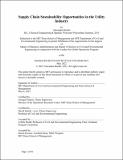Supply Chain Sustainability Opportunities in the Utility Industry
Author(s)
Hardin, Alexandra
DownloadThesis PDF (1.687Mb)
Advisor
Perakis, Georgia
Simchi-Levi, David
Terms of use
Metadata
Show full item recordAbstract
The impact of COVID-19 has shed a spotlight onto global supply chains. There is a renewed focus on both the effectiveness of supply chains, as well as how to operate them sustainably. Governments, corporations, and policymakers around the world are pushing for more sustainable procurement and there is increasing pressure for companies to set carbon reduction targets and pay more attention to the social impact of their operations on their communities.
Recognizing this push, National Grid, an investor-owned utility operating in the United States and United Kingdom, released its Responsible Business Charter (RBC) in October 2020, outlining how the business as a whole would approach creating more sustainable business practices in the areas of environment, community, people, economy and governance.
As with many utilities, National Grid’s business model places its Procurement organization in a unique position to have impact on the initiatives set out by the RBC. Therefore, the Supply Chain Sustainability and Corporate Social Responsibility team within Procurement sought to develop a Supply Chain Sustainability Charter. The purpose of this thesis was to begin the process of developing the charter by assessing potential focus areas for supply chains in the utility industry.
Two themes were identified for the charter, through thorough benchmarking research, surveys, workshops and interviews from both inside and outside of the business. “A Path to Net Zero” and “Community Impact” will be the Procurement group’s focus areas in taking ownership of their own sustainability goals and initiatives. With the themes and charter outline decided on, next steps will include testing, implementation, reporting and final charter delivery.
Date issued
2022-05Department
Sloan School of Management; Massachusetts Institute of Technology. Department of Civil and Environmental EngineeringPublisher
Massachusetts Institute of Technology